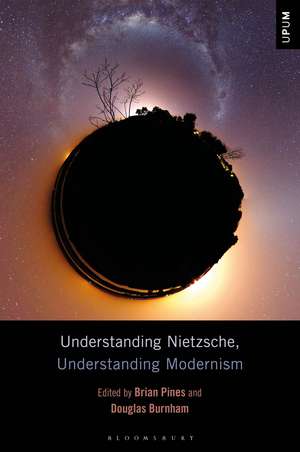Understanding Nietzsche, Understanding Modernism: Understanding Philosophy, Understanding Modernism
Editat de Dr Brian Pines, Professor Douglas Burnhamen Limba Engleză Paperback – 19 aug 2020
| Toate formatele și edițiile | Preț | Express |
|---|---|---|
| Paperback (1) | 226.51 lei 43-57 zile | |
| Bloomsbury Publishing – 19 aug 2020 | 226.51 lei 43-57 zile | |
| Hardback (1) | 775.67 lei 43-57 zile | |
| Bloomsbury Publishing – 20 feb 2019 | 775.67 lei 43-57 zile |
Din seria Understanding Philosophy, Understanding Modernism
- 39%
 Preț: 498.72 lei
Preț: 498.72 lei - 23%
 Preț: 192.82 lei
Preț: 192.82 lei - 30%
 Preț: 570.60 lei
Preț: 570.60 lei - 22%
 Preț: 259.79 lei
Preț: 259.79 lei - 13%
 Preț: 238.84 lei
Preț: 238.84 lei - 13%
 Preț: 238.22 lei
Preț: 238.22 lei - 22%
 Preț: 239.21 lei
Preț: 239.21 lei - 13%
 Preț: 258.33 lei
Preț: 258.33 lei - 22%
 Preț: 238.01 lei
Preț: 238.01 lei - 22%
 Preț: 233.08 lei
Preț: 233.08 lei - 22%
 Preț: 226.51 lei
Preț: 226.51 lei - 22%
 Preț: 226.14 lei
Preț: 226.14 lei - 23%
 Preț: 198.93 lei
Preț: 198.93 lei - 23%
 Preț: 197.86 lei
Preț: 197.86 lei - 23%
 Preț: 194.33 lei
Preț: 194.33 lei - 23%
 Preț: 192.64 lei
Preț: 192.64 lei -
 Preț: 194.33 lei
Preț: 194.33 lei - 23%
 Preț: 191.75 lei
Preț: 191.75 lei - 30%
 Preț: 570.34 lei
Preț: 570.34 lei - 30%
 Preț: 539.73 lei
Preț: 539.73 lei
Preț: 226.51 lei
Preț vechi: 289.80 lei
-22% Nou
Puncte Express: 340
Preț estimativ în valută:
43.34€ • 45.37$ • 35.86£
43.34€ • 45.37$ • 35.86£
Carte tipărită la comandă
Livrare economică 07-21 aprilie
Preluare comenzi: 021 569.72.76
Specificații
ISBN-13: 9781501367595
ISBN-10: 1501367595
Pagini: 344
Dimensiuni: 152 x 229 x 22 mm
Greutate: 0.46 kg
Editura: Bloomsbury Publishing
Colecția Bloomsbury Academic
Seria Understanding Philosophy, Understanding Modernism
Locul publicării:New York, United States
ISBN-10: 1501367595
Pagini: 344
Dimensiuni: 152 x 229 x 22 mm
Greutate: 0.46 kg
Editura: Bloomsbury Publishing
Colecția Bloomsbury Academic
Seria Understanding Philosophy, Understanding Modernism
Locul publicării:New York, United States
Caracteristici
An introduction to Nietzsche for undergraduates or graduates unfamiliar with his work through an overview of his work in part one, a 'way in' to Nietzsche through material that may be more familiar in part two, and a glossary of key terms in part three
Notă biografică
Brian Pines teaches courses in the Philosophy of Religion at Monterey Peninsula College in California, USA.Douglas Burnham is Professor of Philosophy and Head of the University Graduate School at Staffordshire University, UK. He has written extensively on Nietzsche, including Nietzsche's The Birth of Tragedy: A Reader's Guide (2010) and The Nietzsche Dictionary (2014), both published by Bloomsbury.
Cuprins
Series PrefaceNotes on ContributorsAcknowledgmentsList of AbbreviationsIntroduction: The Heroism of Friedrich Nietzsche Brian Pines (Independent Researcher, USA)Part 1 Conceptualizing Nietzsche1. Nonhuman Transcendence: Art and Non-Anthropocentrism in The Birth of TragedyPatricia Valderrama (Independent Researcher, USA)2. Nietzsche's Dawn of Morality: Daybreak and the Modernist ImpulseSiobhan Lyons (Macquarie University, Australia)3. Ticklish Truths: Poetry, Chance, and Laughter in The Gay ScienceScott J Cowan (University of California, Berkeley, USA)4. "What do you matter?": Nietzsche's Zarathustra, Individualism and ModernismDouglas Burnham (Staffordshire University, UK)5. Der Antichrist: A Book for Barbarians, Slaves, and Cave DwellersBrian Pines (Independent Researcher, USA)6. The Twilight of the Idols and the Dawn of ModernityKarl Laderoute (University of Lethbridge, Canada)Part 2 Nietzsche and Modernist Culture7. Peacocks and Buffalos: Nietzsche and the Problems of Modern SpectacleYunus Tuncel (The New School, USA)8. Not another Image of Torment: Nietzsche Eternal Recurrence and Theatricality Jeremy Killian (Coastal Carolina University, USA)9. The Birth of Dada, Out of the Spirit of NihilismKaitlyn Creasy (Butler University, USA)10. Nietzsche's Decadent ModernismAdrian Switzer (University of Missouri-Kansas City, USA)11. Nietzsche's Relation with Psychoanalysis: from Freud to Surrealist Modernism, Bataille, and Lacan Tim Themi (University of Melbourne, Australia)12. Nietzsche, Jung and Modern MilitancyRitske Rensma (University of Utrecht, the Netherlands)13. Streams of Becoming: Nietzsche, Physiology and Literary ModernismJill Marsden (University of Bolton, UK)14. Death shall have no Dominion: Dylan Thomas, Friedrich Nietzsche and Tragic JoyJames Luchte (Independent Researcher, UK)15. The Crisis of Philosophy in Modernity: From Perspectivism to EssayismSebastian Hüsch (Aix-Marseille Université, France)16. Mann >Modernism< NietzscheBill Mcdonald (University of Redlands, USA)Part 3 Glossary17. Dionysiac Douglas Burnham (Staffordshire University, UK)18. Decadence Jack Brookes (Independent Researcher, USA)19. From Zoroaster to Zarathustra Matthew John Grabowski (Independent Researcher, USA)20. Figuration and Imagery Gill Zimmerman (Zeppelin University, Germany)21. Danger Scott J Cowan (University of Milwaukee, Wisconsin, USA) and Brian Pines (Independent Researcher, USA)22. The Eternal Recurrence Karl Laderoute (University of Lethbridge, Canada)23. The Will to Power Karl Laderoute (University of Lethbridge, Canada)24. The Revaluation of all Values Brian Pines (Independent Researcher, USA)Index
Recenzii
Perhaps no other intellectual figure has exerted such a powerful influence on philosophical, literary, and cultural modernism as Friedrich Nietzsche. This volume, edited by Brian Pines and Douglas Burnham, showcases essays that illuminate well the character of this influence and in all its audacious and dazzling glory.
Approaching the massive profile of Nietzsche's work from a plethora of new, partly text-specific, and partly overarching angles, Brian Pines and Douglas Burnham have put together a volume that both suggests and initiates a complex conversation with our twenty-first-century present, an environment still far from being captured in a conceptually transparent and consensual way. They thus decisively leave behind a state of discussion that was locked in the sterile question of whether Nietzsche's thought had a place within 'modernity' as a straight line of progress.
Approaching the massive profile of Nietzsche's work from a plethora of new, partly text-specific, and partly overarching angles, Brian Pines and Douglas Burnham have put together a volume that both suggests and initiates a complex conversation with our twenty-first-century present, an environment still far from being captured in a conceptually transparent and consensual way. They thus decisively leave behind a state of discussion that was locked in the sterile question of whether Nietzsche's thought had a place within 'modernity' as a straight line of progress.
